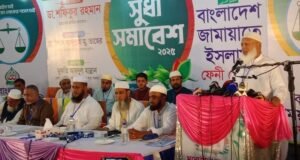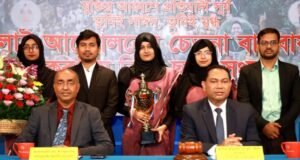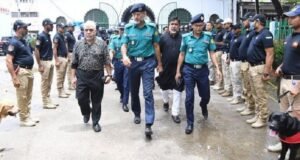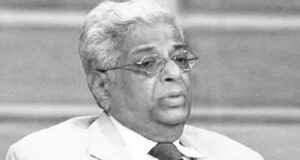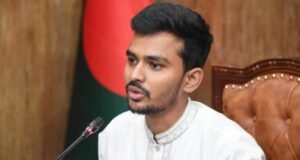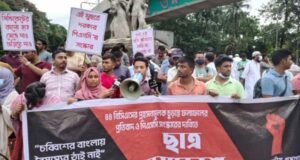
Bangladesh Jamaat-e-Islami has made 10-pont proposals for the interim government to reform the state including restoration of caretaker government system.
The party’s Nayebe Ameer Syed Abdullah Md Taher unveiled the proposals at a press conference held at Hotel Westin at Gulshan-1 in Dhaka early Wednesday (October 9) afternoon.
Later, Jamaat Ameer Shafiqur Rahman said they had as many as 41-point reform proposals, which were more elaborate. Now, they had given 10-point proposals. “We have just made the proposals which the interim government needs to give priority. The elected government will look into the rest of the proposals after coming to power,” he said.
Shafiqur Rahman said autocrat Sheikh Hasina fled the country resigning from power on August 5 last in the wake of student-people’s mass uprising and in exchange of more than 1,500 precious lives. The interim government was formed on August 8.
According to the Jamaat chief, the interim government’s main task should be holding the 13th Jatiya Sangsad election through fundamental reforms within a short time-frame and handover power to the elected representatives of people. Extensive reforms have become imperative in some election-related institutions to make the next polls free, fair and meaningful. Election will never be free and fair without reforms.
On behalf of the Bangladesh Jamaat-e-Islami, party’s Nayebe Ameer Syed Abdullah Md Taher unveiled a 10-point proposals to bring reform to some vital sectors of the state.
Restoration of Caretaker Govt and Abolition of EVM
Jamaat-e-Islami reiterated its demand for the reinstatement of the caretaker government system for national elections.
In this regard, the party accused the Awami League abolishing the electoral process. “The ruling party destroyed the electoral system by abolishing the caretaker government,” Taher said, stressing the need for its permanent restoration and the cancellation of the EVM system.
Police Reforms and Accountability
The party called for reforms in police laws, proposing the creation of an independent commission for transfers and promotions to eliminate political interference.
In this regard, Dr. Taher called for incorporating religious and moral education into police training and reducing the use of lethal weapons.
Reforms in Government Employment
On government employment, Jamaat proposed that job applications should be free of charge and that the maximum age limit for entry into government jobs be raised to 35 years for the next two years and then set permanently at 33 years, with retirement at 62. The party also demanded the cancellation of appointments obtained through leaked examination papers or corruption.
Strengthening the Anti-Corruption Commission (ACC) to operate independently was another key recommendation.
Term Limits for Prime Ministers
Jamaat proposed a two-term limit for anyone holding the office of Prime Minister, advocating for a balance of power between the Prime Minister and the President.
Cultural and Educational Reforms
The party also suggested reforms in the cultural and educational sectors, recommending the inclusion of teachings about Prophet Muhammad (PBUH) in all levels of education. They further called for the elimination of obscenity in films, television dramas, and digital content.
Foreign Relations and Hajj Costs
On foreign policy, Dr. Taher emphasized the importance of fair and balanced relations with neighboring countries, particularly on shared rivers with China, Nepal, and India. Jamaat also urged the government to take effective steps to reduce the costs of Hajj and Umrah for pilgrims.
Accountability for Genocide
Jamaat-e-Islami demanded that those who had committed genocide and fled the country be brought back and tried in court.
Election vs. Reform: Jamaat’s Roadmap
When asked about the sequence of elections and reforms, Dr. Shafiqur Rahman said that there would be two roadmaps—one for reforms and one for elections. He emphasized that neither process should be excessively long or rushed, noting,
“There are many political parties in the country. For a vibrant parliament, the public must vote for the right candidates, not just the party.”
Jamaat’s Nayebe Ameer Mujibur Rahman, ANM Shamsul Islam, ATM Masum, central leaders Saiful Alam Khan, Rafiqul Islam Khan, Matiur Rahman Akand, Hamidur Rahman Azad, Abdul Halim, Ehsan Mahbub Zobayer, Nurul Islam Bulbul, Selim Uddin and Mobarak Hossain, among others, were present at the press conference.
 Weekly Bangla Mirror | Bangla Mirror, Bangladeshi news in UK, bangla mirror news
Weekly Bangla Mirror | Bangla Mirror, Bangladeshi news in UK, bangla mirror news


